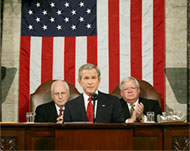Shia leader eyes Iraq premiership
The Shia list that won Iraq’s elections has agreed to present interim Vice-President Ibrahim Jaafari as its candidate for the premiership, as parties haggled over the makeup of the next executive.

Jaafari, poised to succeed Iyad Allawi and become Iraq‘s first elected prime minister since the collapse of Saddam Hussein’s regime in April 2003, is a popular politician who heads the country’s oldest Shia party, Dawa.
“In two or three days it will probably be announced that Jaafari is the candidate for the premiership. We anticipate this to happen in a few days,” said Jaafari’s deputy, Adnan Ali.
A source from the rival Supreme Council for the Islamic Revolution in Iraq confirmed that its candidate, interim Finance Minister Adil Abd al-Mahdi, had dropped out of the race.
Shia premiership
“Doctor Jaafari was chosen after discussions with the other lists and agreement on this question was reached yesterday (Monday),” said United Iraqi Alliance candidate and SCIRI member Janan al-Ubaidi.
 |
|
The strong Kurdish coalition could |
The main Shia coalition backed by Ayat Allah Ali al-Sistani – the top Shia cleric in Iraq – is set to control more than half of the seats in the 275-member National Assembly and is widely expected to be handed the premiership.
The joint ticket on which the two main Kurdish parties ran also made a strong showing in the 30 January general elections – for which results were announced on Sunday – and could determine the presidency.
The Sunnis, who boycotted the elections, fared poorly and will be almost absent from parliament, could yet be handed the post of parliamentary speaker, as part of a general effort to involve the community in the drafting of a constitution.
Fear of marginalisation
But leading Sunni groups reiterated their call for a withdrawal timetable for US troops to be announced before they enter the political arena.
Some fear a marginalisation of Iraqi Sunnis could further fuel the insurgency, which has killed thousands and crippled the economy since the US-led invasion in March 2003.
Officials and experts have predicted that haggling will carry on for several days before all key positions are announced simultaneously.
But the election results were not final because the electoral commission was still investigating complaints about the results.
“We have received three complaints,” electoral commission official Adil al-Lami said, declining to specify their origin and content.
Bush increases budget
On Monday, US President George Bush asked lawmakers for $81.9 billion for the US military in Iraq and Afghanistan as well as for Indian Ocean tsunami relief.
 |
|
Bush requested $82 bn for the US |
“This request reflects urgent and essential requirements. I ask the Congress to appropriate the funds as requested and promptly send the bill to me for signature,” he said in a statement.
The proposal includes $7.4 billion to accelerate the training of local security forces in Afghanistan and Iraq. Bush has made the latter a precondition for withdrawing about 150,000 US troops in Iraq.
It also includes $717 million for US embassy and security expenses in Iraq, including $658 million to build a permanent facility for US diplomats in Baghdad.
Meanwhile, Turkish shipping magnate Kahraman Sadikoglu, who was taken captive on 19 December, returned home after his release on Monday in the south of Iraq.
He flew into Istanbul airport on a private plane.
About 80 Turks, most of them truck drivers plying Iraqi roads, have been killed in recent months. A number of Turkish companies active in Iraq ceased operations in return for the release of employees taken captive.